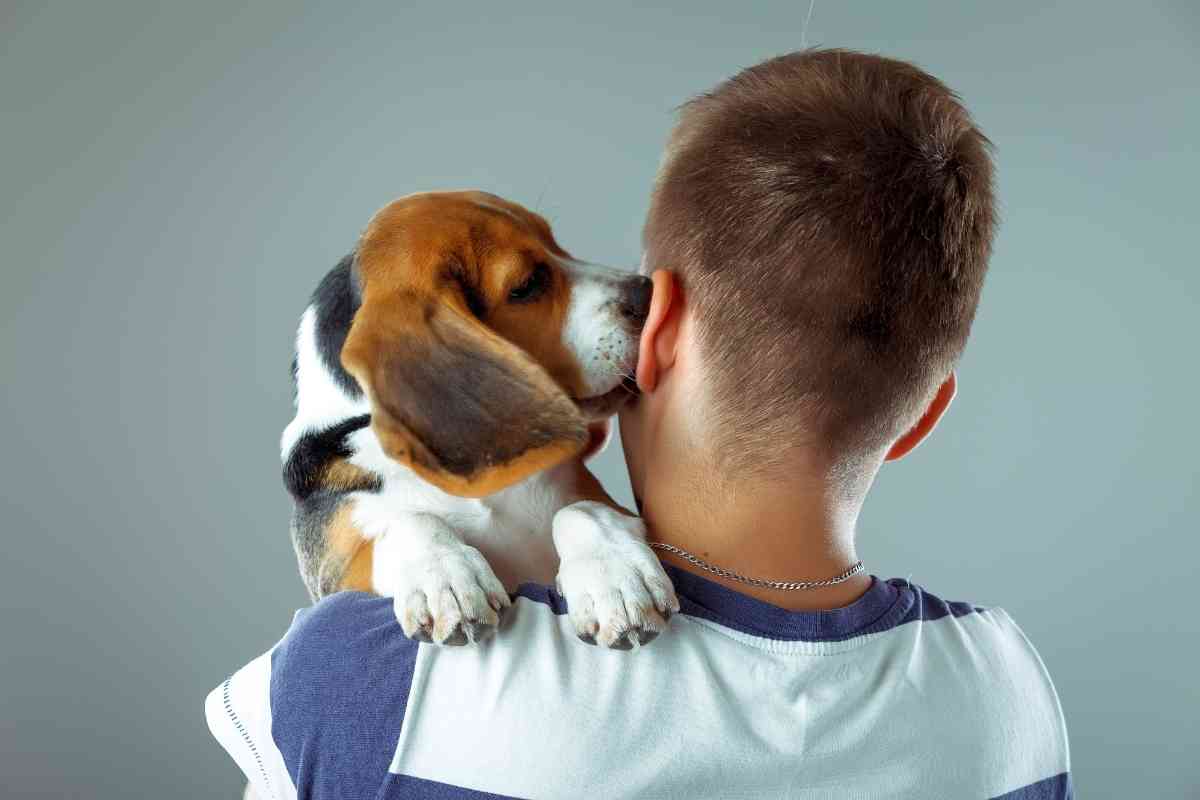5 Reasons Why Your Puppy Bites Your Ears
You may be curious why your puppy bites your ears. Puppies love to explore and put things in their mouths, from your arms and toes to the ears. While ear biting and nibbling may be coming from a good place, your puppy may bite too hard. Unfortunately, the behavior may escalate, leading to aggressive biting as the puppy ages. You should therefore know when to stop it.

Why does my puppy bite my ears?
Puppies bite ears to engage you to play, show affection and show their comfort with the surroundings. Sometimes your puppy will bite your ears due to boredom, hunger, anxiety, improper training, and as a sign of dominance.
Ear nibbling is normal for puppies, and you shouldn’t worry about it. They often do it to show affection and play, just like other dogs, but you should distinguish between playing and signs of aggression. Learn why your puppy bites your ears and the best way to discourage the behavior.
Pet behavior experts and trainers have figured out a combination of reasons puppies bite ears and effective ways to stop the behavior.
Puppy Bites Your Ears…Explained!
Your canine nibbles on your ears for several reasons:
They Want to Play
Playful puppies bite their parents’ and other dogs’ ears. Ears attract them as they are easy and accessible targets. By biting the ears when playing, dogs try to express dominance.
Unfortunately, during play, the bite can result in an injury when your puppy applies too much pressure. You know your dog nibbles on your ears to play when they wag their tile, bite without hurting you, and show subtle signs of submission.
Your puppy will bite in aggression if they feel pain or fear, and when excited. When playing turns into aggression, you can stop the biting by using the distraction technique by making a loud noise.
Boredom
Dods are social beings, and boredom affects them in many ways. Puppies chew on their parents’ ears to entertain themselves when bored. Apart from biting your ears, other signs that signify boredom in your puppy include excessive barking, digging, humping on things, chewing your socks and blankets, and whining.
Boredom makes puppies unhappy and is unhealthy. Boredom can cause depression, obsessive-compulsive behaviors, and separation anxiety. The common causes of boredom in puppies are limited socialization, inadequate mental stimulation, insufficient training, and lack of exercise.
To relieve boredom, buy toys for your puppy for mental stimulation, indulge them in physical exercise by taking them for a walk or playing in the yard and give them more training. Allow your puppy to socialize, expose them to new places, and take them to meet canine companions.

Separation Anxiety
Your puppy will bite your ears when they are happy to see you. When you get home and settle, they will reach for your ears and start nibbling due to over excitement. Dogs with separation anxiety often experience such excitement.
To determine if your dog nibbles your ears due to anxiety, look for other signs of separation anxiety like howling, pacing, barking, house soiling, coprophagia, destruction, and crying when you leave. Common causes of separation anxiety are abandonment, schedule changes, and new residences.
Playing with your puppy, giving your dog physical exercise, and training before you leave can help address separation anxiety. To cure separation anxiety effectively, identify the cause of the problem.
Hunger
Puppies nibble on their parents’ ears to communicate hunger. It is a gesture for you to give them food. You can tell your dog is hungry when they bite your ear, if they missed a meal, have been active recently, and when you can feel their ribcage.
They may also ask for food if you give them a low-quality diet, varying amounts of food for meal times, an inconsistent feeding schedule, and when you provide them with table scraps. Ear nibbling when you are having your food accompanied by barking and whining are signs of hunger.
By improving your dog’s diet and feeding schedule, you have a well-fed puppy who does not bite your ears, bark during mealtime, or beg for food.
Attention-Seeking
Puppies nibble ears in a quest for attention. Puppies are social and crave the spotlight; they will do everything they can to get you to notice them.
In addition to ear biting, other attention-seeking habits include dropping toys and items in front of you, jumping on you, pulling your clothes, barking, and stealing items from your hands in the pursuit of a chase.
If your puppy nudges their nose on you and bites your ears in the quest for attention, you can address the attention-seeking behaviors by calming them, ignoring them, petting them, or just walking away.
Ear-nibbling by your puppy is a communicative behavior. Your puppy can demonstrate their love and affection for you through ear bites, communicate discomfort, and tell you they need something like food and attention.
Should You Stop Your Puppy from Biting Your Ears?
Ear-nibbling by your puppy causes minimal health risks. However, letting your puppy bite your ears encourages the behavior that persists. Eventually, your pet will start nibbling other people.
You could get an infection if your puppy licks an open wound due to the dirt in their mouth. You also risk an ear infection. You can stop the behavior by:
Don’t Encourage Them
Making your puppy think the behavior is allowed will condition them to persist. Avoid encouraging the behavior by pulling away when they nibble. You could also move to a place that limits their access to your ears.
Wait for your pet to stop biting your ears and calm down, reward them with treats, and encourage them to behave.
Redirect Their Energy
Puppies nibble their ears when they want to engage in play. They also do it when they are bored. Direct their energy to exercise, and they will be calmer and more relaxed.
Give your puppy at least 30 minutes of exercise every day, and they will have less energy to try to reach your ears.
Employ the Distraction Technique
Use the distraction technique to deter your pet from nibbling your ears. Puppies are easy to distract, and you can effectively do that using a chew toy. It will intrigue your puppy and divert their attention.
You could also make loud sounds whenever your puppy nibbles your ears.
Feed Them Adequately
Dogs bite their parents’ ears to communicate hunger. Addressing hunger will stop the biting. Give your pet the right amount of food at regular intervals.
Also, avoid giving the puppy your food during your meal time as it can encourage begging when you don’t.
Give your puppy a high-quality and balanced diet to ensure you meet their nutrition requirement.
Respond to Their Needs
In isolated cases, your puppy will bite your ears to communicate they need something. If it is time to take care of their needs, do so. Once you fulfill the requests, the biting will stop.
Your puppy may bite your ears when bored, anxious, excited, hungry, or need attention. They communicate those feelings by nibbling your ears. While harmless, it is best to discourage the behavior as your puppy could transfer germs and nibble on other people that don’t like it.
You can discourage the behavior through training, redirecting their energy, and responding to their needs if they want something.